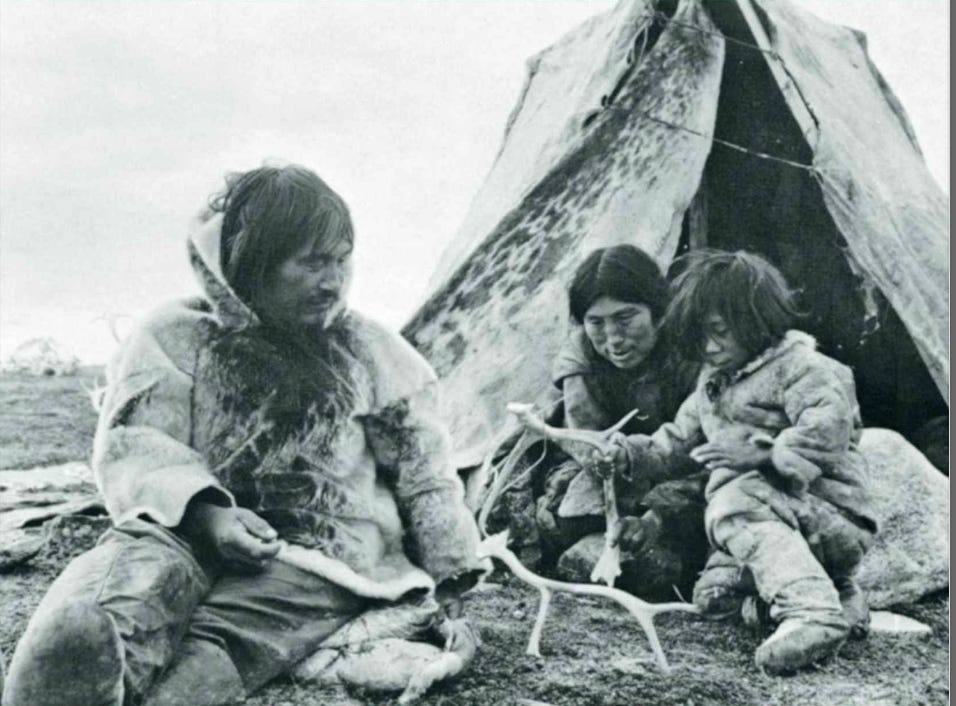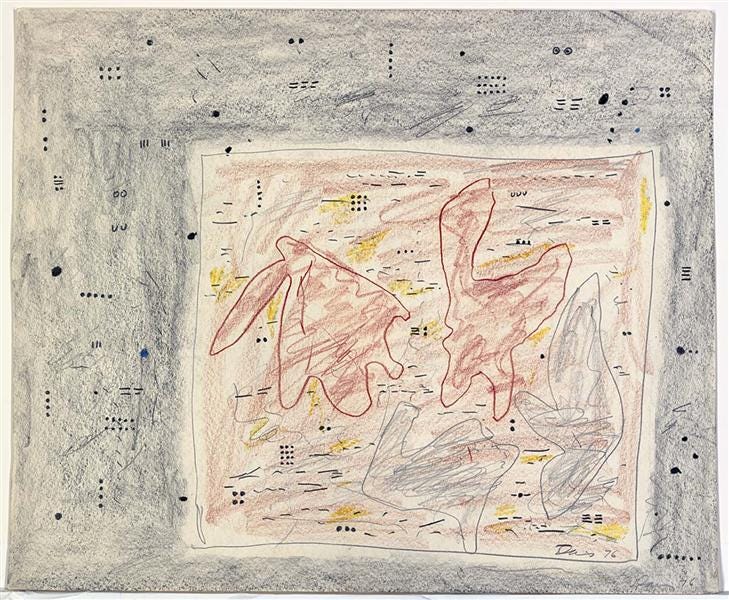Historian chooses faith over fact
Eskimos without science, Democrat religiosity, drunkenness after sermons, and the endless tribal wars of religion..
SPARE A THOUGHT FOR THE PROXY-PRIMITIVES
Asen Balikci, The Netsilik Eskimo, Waveland Press 1970
ELEMENTS OF NETSILIK RELIGION
Religious beliefs and ritual observances had a great influence on Netsilik social life and formed the intellectual basis of its culture. Religion explained the world's past, present, and future states, helped control numerous crisis situations, influenced interpersonal relations, and reduced fear. Essentially the relation of society to nature was mediated by a series of symbolic representations and actions increasing an individual's feeling of security in a hostile environment.
The Netsilik believed that both the vast, cold universe and their individual camps were inhabited by supernatural beings of many different kinds. Most important were the human souls, of which there were three species: personal souls, name souls, and ghosts of deceased men and women. In addition, people were surrounded by amulet spirits with important protective powers. Animals also had souls, some incarnated and some free floating and ghost-like. Shamans had the ability to harness many of these ghosts for specific tasks as personal protective spirits. Another category of supernaturals that inhabited certain areas of the country included various monsters, giants, and dwarfs, mostly anthropomorphic in nature. …
The Netsilik obtained their manly strength mainly from their souls. The human soul was thought to consist of a mysterious yet extremely powerful force. It contained the life force of a human being and gave him the power to act energetically and with determination. The soul strengthened the hunter's capacity to withstand hardship, enabled him to make quick and appropriate decisions, and was generally the source of all will power. Further, the soul gave a man his identity. The soul contributed to good health and animated a man's whole body. It was assumed that a man’s soul was similar to his physical appearance both in size and in facial characteristics. Generally the soul resided in the hunter's body, occupying it in its entirety.
In some cases … mention is made of very small human souls, about two inches in height, that evil sorcerers could pull from under their sleeves. These small souls could be given instructions and sent out to enter men's bodies, bringing them great misfortune or death. … Netsilik women also had souls, though little is ever mentioned about them.
Other than religion the Eskimos had no compass…
Eskimo Map by Gene Davis, USA 1976
HISTORIAN NIALL FERGUSON ‘ALL AT SEA’ WITHOUT A COMPASS
7:52 PM Dec 21, 2024
I talked to Greg Sheridan of @australian (for the first time publicly) about becoming a lapsed atheist and embracing the Christian faith. I'm afraid it's behind a paywall (unlike Heaven), so here are the quotes in a thread: 1/17
Quietly, but with great commitment, Ferguson has become a religious believer. With his wife, @Ayaan Hirsi Ali, and their sons, he has become a churchgoing Anglican Christian. He is, in his own words, a "lapsed atheist". Much more important, he’s a believing Christian. 2/17theaustralian.com.au/inquirer/how-h…
Though Ferguson sees profoundly the crisis of our times, and the contribution to that crisis brought about by the abandonment of Christianity, this is not primarily a political conversion. It's a deeply personal and deliberate turn to faith by a man who was formerly a lifelong atheist. 3/17
"I have embraced Christianity," he tells me. "We were all baptised, Ayaan and our two sons, together in September ... It was the culmination of a quite protracted process. My journey was from atheism. My parents had left the Church of Scotland, I think even before I was born. I grew up in a household of science-minded religious sceptics. I didn't go to church and felt quite sure of the wisdom of that when I was young. However, in two phases, I lost my faith in atheism." 4/17
"The first phase was that as a historian I realised no society had been successfully organised on the basis of atheism. All attempts to do that have been catastrophic. That was an insight that came from studying 18th, 19th and 20th-century history." 5/17
"But then the next stage was realising that no individual can in fact be fully formed or ethically secure without religious faith. That insight has come more recently and has been born of our experience as a family." 6/17
"I got my older children baptised because I had a sort of (Alexis de) Tocqueville view that religion was good for society. It was part of Western [civilization] and I felt I should embrace it. But I would attend church (occasionally) in a spirit of scepticism and detachment." 7/17
"I felt that if I was a conservative, and believed in the institutions of tradition, living in England it was kind of preposterous not to go to one's local church. It was a kind of Tory impulse. I was in that state of mind where if the left was against religion, we should be for it. I was in favour of it. That was enough." Now it’s different: "Now I attend church in a spirit of faith. Also I'm a learner. I learn about Christianity every week. I try to understand it better." 8/17
"What Jesus taught us was that there were things we couldn't know. We couldn't know God's intent. When I read the Bible I don't say: show me the miracle. My attitude is that this extraordinary document is describing the life of a unique individual whose power to transform the world has never been equalled. That's good enough for me." 9/17
But does he think it’s true that Jesus rose from the dead, and the rest? "I just don’t think that one can know that with certainty. But I think the teaching about how one should live, and the relationships one should have with one's fellow human beings, is so powerful that I prefer to live as if it's true. I can't know, but it seems to me it’s preferable to live as if those claims are true. It’s hard to feel bound by the teachings if they’re lies." 10/17
"Faith is fundamentally different from reason. One can't reason one's way to God, at least I don't think one can. The nature of faith is that one accepts that these apparently farfetched claims are true." 11/17
Does Ferguson pray? "Yeah, I pray." Do you feel you’re praying to someone real? "Absolutely, just as there are no atheists in a foxhole, there aren't many atheists when your child goes missing, when the life of somebody you love is threatened. Is it a kind of delusion to pray to an invisible super intelligence? I probably used to think that it was. But I prefer to think that prayer is meaningful, on the basis of faith in Christ. I don't think of it that I'm on the phone to God but I am trying to convey to that which is beyond reason my fervent desire that my son not be killed or my daughter won’t have gone missing." 12/17
"These are powerful human impulses it seems utterly cruel to deny. To say, as I would have done as an atheist, this is all utterly pointless, the fate of your child is a matter of statistical probability, prayer is the equivalent of voodoo or the witchdoctor, don't pray, it's pointless – this is a cruel injunction. I've spent 60 years on this planet and I'm convinced that we can't be spiritually naked, we can't be spiritually void, it's too miserable. I have five children, and in the life of every child there's at least one disaster that seems as if it might be fatal. If you don't pray in those moments you're not flesh and blood." 13/17
"I think there are a bunch of militant cults and religions, some derived from Christianity, that compete now in a deeply disorienting pseudosecular civilisation. I say pseudosecular because I agree with Tom Holland (author of Dominion) [MGH: also a SOCIAL SCIENCE FILES subscriber] that a lot of Christianity is still there in the operating system but people are in denial about it. They don't even recognise the Christian roots of much that they believe. This goes to the environmental movement and the strange cult of wokeism. There are lots of curious mutant forms of Christianity afoot, I think. But that's not the bad thing. I suspect throughout history the true culture, or milieu, has always been quite eclectic." 14/17
Ferguson can live with that. What really upsets him is this: "We've given up on religious observance. This is a mistake – the empty churches on Sundays, people not saying grace at dinner. We've lost observance and in doing that we've lost something very powerful and very healing. It's not so much that we're culturally floating in an eclectic mishmash of half-remembered theology, it's that we've just stopped being Christians. That seems to me a more serious problem." 15/17
"What strikes me, as a regular churchgoer now, not having been one before, is how much one learns every Sunday morning. Every hymn contains some new clue as to the relationship between us and God. I think the educational benefit of going to church almost equals the moral benefit, the uplift, the sense one gets of being somewhat reset." 16/17
"All of this matters hugely and as a society we've turned away from it. That explains, much more than the rise of social media, the mental health problems that characterise our societies today. We're all sort of running this experiment, without God and without religious observance. And it's not going well. But we blame it on the smartphone or on Twitter. I think the real explanation for the mental health epidemic is that we've thrown away those wonderful [religious] support mechanisms that evolved over centuries to get us through."
[END]
MGH: Of course, there are zillions of support mechanisms other than religion, if you need them. Blaming mental illness on lack of religion is absurd. Sheridan’s unhinged born-again evangelical sermons about Christ at The Australian newspaper were the reason I unsubscribed from The Australian. He was once a good foreign editor. But how far can one trust a religious zealot to report for you on global war and peace?
For ‘uplift’ Ferguson could have tried gliding instead of yachting. After being expelled from a religious English ‘public’ school I was packed off age 15 to work on an airfield for several months. My payment for this ‘reset’ was a full course in gliding and the thermodynamics of uplift taken near Salisbury alongside a group of English army paratroopers in training. I feel I have been enlightened and elevated ever since.
THE ‘RELIGIONS’ OF WESTERN POLITICS
The Democrats’ Religion: Party elites treat Trump votes as apostasy…
By William McGurn, Nov. 11, 2024
… To call a view a religion usually means it’s beyond debate or reason. The left’s zealotry can sometimes look like that—witness all those videos of Harris voters melting down at the election outcome. But the better way to look at the Democrats and religion is as a larger view that makes sense of the world to its adherents. …
.. Take climate change. It comes with all the tropes of a religion: descriptions of Earth as an Eden despoiled by man, predictions of end times if we don’t radically change our ways, and indulgences that allow celebrities to jet around the world so long as they drive electric cars to atone for their carbon sins. That also explains why green politics almost always elevates the radical over the sensible.
Or identity politics. The simplistic beauty of identity politics is that it separates people into oppressors and victims. The ultimate oppressors are straight white men who have created a structure that keeps sexual and racial minorities down.
If this worldview is correct, justice demands correcting these wrongs on everything from college admissions to hiring and promotion decisions. How different this approach is from the dream of Martin Luther King Jr., an America where his children would be judged by the content of their character and not the color of their skin. But today the groups fighting to evaluate people by skin color aren’t the fat white Southern sheriffs of caricature but the liberal civil-rights activists who push race preferences.
Ditto for sex. There is no scientific basis for saying that men can become women or women can become men. Yet this is unquestioned orthodoxy within many parts of the Democratic Party. Today there are policies that let students live by a different “gender identity” during school hours while their moms and dads are deliberately kept in the dark. And look at the inquisition that descended on Democratic Rep. Seth Moulton for saying boys shouldn’t be allowed to play girls’ sports.
Even on economics a quasi-religious view holds. In this view, policy is a struggle between good and evil. So if there is inflation, it isn’t because of any government spending or policies but because the evildoers are “price gouging.” This is also why, more than four decades after Reagan was first elected, no one has ever specified a percentage for the fair share of taxes the villainous wealthy ought to pay. In economic theology, “fair share” always means “more.”
… The Democratic Party today holds orthodoxies, pieties and heresies every bit as dogmatic and unyielding as traditional religion. And it’s the reason so many Democrats are responding to the election results not by re-examining their own policy positions but by blaming the voters for their apostasy.
[END]
My rules for church readings
by Douglass Murray, 14 December 2024
It is that time of year when people in churches across the land have to face the difficult question of how to read scripture out loud. I count myself a bit of an expert in this, not because I have had to do it many times for some 35 years, but because I have seen everything go wrong that can go wrong. …
… Some ten years ago or so at The Spectator service it was our late colleague Jeremy Clarke’s turn to read the passage about the Annunciation. The rendition stays with me and moves me still. For Jeremy knew that the key to reading scripture out loud is simply to say it in the way you would say anything else – in your own, perhaps God-given, voice.
Jeremy read the Gospel of Luke as though he had never heard the story before. Every line, every pause and every look up at the congregation as he relayed the story of Mary and Joseph was suffused with a sense of utter wonder. The general tone was: ‘Cor, have you heard this stuff? It’s bloody amazing.’
We got pretty pissed at the pub afterwards, and that is another story. …
[END]
ON THE SIDE OF ENLIGHTENMENT’S GREATEST PHILOSOPHER
[In] his three new essays of 1748 [David Hume] argued that utility, ‘the general Interests or Necessities of Society’, was the only rational ground for obedience. But he did not consider the arguments of those who contended that only legality secured peace and therefore prosperity … the new essays argued that ‘resistance’ to government was ‘admitted in extraordinary Emergencies’ … Hume confessed that ‘I shall always incline to their Side, who draw the Bond of Allegiance the closest possible, and consider an Infringement of it, as the last Refuge.’ …
… By resisting the ‘Superstitions’, had Hume vindicated the ‘Science’? The critique of Christianity, rather than the establishment of a science of man, had now emerged as Hume’s overt goal. He tried again, rewriting the third volume of the Treatise and publishing it in 1751. It repeated his criticisms of priests, but the treatment of politics was compressed into one section, in which he merely urged once more that ‘the SOLE Foundation of the Duty of ALLEGIANCE is the Advantage which it procures to Society, by preserving Peace and Order amongst Mankind’. …
… Two world wars had not discredited such optimistic aspirations. Indeed, those aspirations reached their high water mark after 1945, notably in the United Nations’ Universal Declaration of Human Rights of 1948. Nevertheless, the subsequent widespread adoption of the notion of the Enlightenment may have reflected needs more than achievements. In the defeated Axis powers historians not implicated in totalitarianism tended to fall back on what they now depicted as older national Enlightenments as a cultural resource, a source of hope. …
… Practice has become ever more important as against principle. The notion of the perfectibility of man has been compared with the outcomes of a variety of post-1945 social reform programmes. Science’s putative role in creating utopias has been set by its historians against its roles in genocide, environmental destruction, and social control. Religion has reemerged in the minds of believers… to become a leading cause of conflict. Wars, and notably wars of religion, are increasingly prevalent. … [Clark, J. C. D., The Enlightenment: An Idea and Its History, Oxford University Press 2024]
Here was me a few days ago complaining about “the recrudescence of religiosity and atavism with corollaries for war and peace”.








